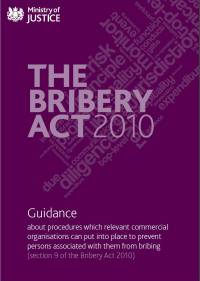
We have been waiting for some guidance from the United Kingdom about their new Bribery Act since it received Royal Assent last April. The delay on the guidance has delayed the implementation of the Bribery Act itself. Now the guidance is out.
The Bribery Act 2010 creates a new offence under section 7 which can be committed by commercial organisations which fail to prevent persons associated with them from bribing another person on their behalf.
An organisation that can prove it has adequate procedures in place to prevent persons associated with it from bribing will have a defence to the section 7 offence.
The guidance, published here under section 9 of the Act, will help commercial organisations of all sizes and sectors understand what sorts of procedures they can put in place to prevent bribery, as mentioned in section 7.
With the release of the guidance, Kenneth Clarke, Lord Chancellor and Secretary of State for Justice, announced that the Bribery Act will go into force on July 1.
Bribery and Corruption are bad and we want to have systems in place to prevent them and to detect them if they happen. Tucked into Section 9 of the Bribery Act was requirement that the Secretary of State publish guidance about procedures which commercial organizations can put in place to prevent persons associated with them from bribing. Under section 9 of the Bribery Act, the only defense against criminal liability for a commercial organization which has “failed to prevent bribery” is that the organization had adequate procedures” to prevent bribery.
In what appears to be a very user-friendly approach the Ministry of Just has published a Quick start guide (PDF 0.27mb 9 pages) to get you up to speed on the Bribery Act.
Commercial Organization
Of course there is some question about the applicability and enforcement beyond the borders of the United Kingdom. Clearly, if you have operations in the UK and those employees are paying bribes for business to be sent to those operations then it falls under.
If you have an office in London, are all of your operations worldwide subject to the Act? I’m sure we will find out, eventually.
It will be up to the court to decide whether or not any individual organisation can be said to be ‘carrying on a business’ in the UK. They obviously take a range of factors into account – mere listing on the London Stock Exchange or just the fact of having a UK incorporated subsidiary would not necessarily mean the Act applies. To be clear: this is not a ‘carve-out. Under the terms of the Act, it has always been a decision for the courts. – Kenneth Clarke, Lord Chancellor and Secretary of State for Justice
If you have a London office (or operations somewhere in the United Kingdom), or other “demonstrable business presence in the United Kingdom” you should pay attention to the Act. However, merely being listed on the London Exchange alone would not be enough. (See paragraph 36 in the guidance.)
Hospitality
According to Quick Start Guide:
The government does not intend that genuine hospitality or similar business expenditure that is reasonable and proportionate be caught by the Act.
In any case where it was thought the hospitality was really a cover for bribing someone, the authorities would look at such things as the level of hospitality offered, the way in which it was provided and the level of influence the person receiving it had on the business decision in question. But, as a general proposition, hospitality or promotional expenditure which is proportionate and reasonable given the sort of business you do is very unlikely to engage the Act. So you can continue to provide tickets to sporting events, take clients to dinner, offer gifts to clients as a reflection of your good relations, or pay for reasonable travel expenses in order to demonstrate your goods or services to clients if that is reasonable and proportionate for your business.
That may actually be a broader ability to deal with government officials than under the FCPA.
Facilitation Payments
Facilitation payments, which are payments to induce officials to perform routine functions they are otherwise obligated to perform, are bribes. There was no exemption for such payments under the previous law nor is there under the Bribery Act.
That is more strict than the FCPA. They do leave it open to prosecutorial discretion, that based on the facts and circumstances they can decide whether prosecution is in the public interest.
Foreign Public Official
Over here in the US it looks like there some be some court decisions coming down that will add clarity to the definition of a foreign official under the US FCPA. Here is the guidance under the Bribery Act as to who is a foreign public official:
A ‘foreign public official’ includes officials, whether elected or appointed, who hold a legislative, administrative or judicial position of any kind of a country or territory outside the UK. It also includes any person who performs public functions in any branch of the national, local or municipal government of such a country or territory or who exercises a public function for any public agency or public enterprise of such a country or territory, such as professionals working for public health agencies and officers exercising public functions in state-owned enterprises. Foreign public officials can also be an official or agent of a public international organisation, such as the UN or the World Bank.
There is lots to digest in the guidance. Ultimately, other than the removal of facilitation payments I does not seem that compliance with the UK law would be any different than compliance under the FCPA.
Sources:











